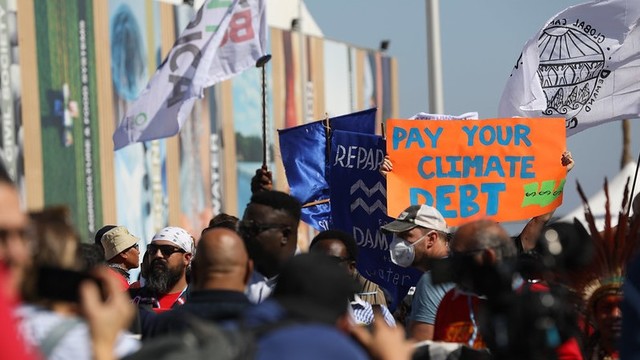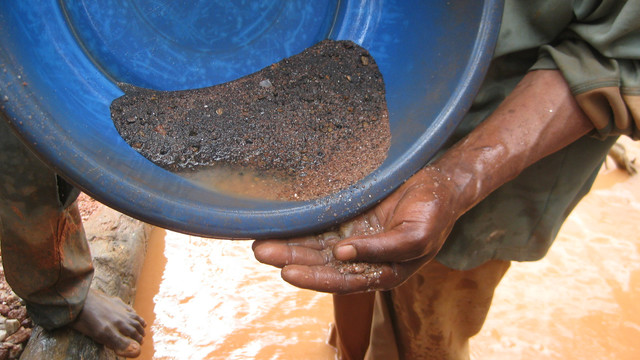
The front cover of IIED's 2016/17 annual report (Photo: Mike Goldwater)
The IIED Annual Report 2016/17 summarises the institute's activities during the year. The focus of this year's report is impact – how IIED is helping to foster positive change at both the local and international scale, and across key research areas.
The report sets out how IIED and its partners seek to influence change through research, dialogue and practical engagement. In his introduction to the report, IIED director Andrew Norton says: "We hope the stories in this report demonstrate the value of our approach – and the very real differences that IIED and its partners are making."
Delivering impact across four research areas
The annual report sets out how we achieved positive impact in each of our four focus areas.
As part of our work to shape sustainable markets, we undertook research with our partners on finance for energy access for the world's poorest communities. Our findings highlighted the importance of funding decentralised energy projects. These findings were highlighted by the Least Developed Countries Group when it launched its new Renewable Energy and Energy Efficiency Initiative. We are also advising the United Nations' Sustainable Energy for All initiative on its research into finance flows.
IIED works to support fair and equitable solutions to climate change. We worked with the group of Least Developed Countries to make sure the voice and message of the world's poorest are heard in international negotiations. We worked through official processes to help establish the rules and systems the international community needs to implement the Paris Agreement.
We also supported national and local governments in Kenya, Tanzania, Mali and Senegal to improve climate planning. This year has seen increasing buy-in to our approach from governments in all four countries, as well as growing interest from the international development community.
IIED's urban research stream seeks to foster cities that work for people and the planet. In 2016 the world's urban specialists gathered in Ecuador for Habitat III, a global summit on housing and urban issues which is convened every 20 years. IIED provided opportunities for urban poor groups to meet with a wide variety of urban stakeholders at the summit, including the private sector, international institutions and national governments. This gave urban poor federations the opportunity to set out their priorities for slum upgrading and demonstrate how they are using community initiatives to improve their environments.
Our work on natural resources seeks to achieve increased investment in locally controlled land and natural resources. Large-scale agricultural investments can mean that communities lose access to land they depend on. This particularly affects women, who have to travel further to grow food or collect water and firewood. Yet women's voices are rarely heard in discussions over land deals.
We are working in villages in Tanzania and Senegal to strengthen local decision-making processes on land governance, and ensuring women have a say in the process. In Ghana we're working to increase women's influence in the land allocation process at village level, to increase their access to and control over land.
Publications
IIED's Publications Library now has more than 6,700 publications available for download. During 2016/17, more than 40 per cent of downloads came from the global South. Our annual report highlights IIED's role in publishing evidence and guidance on key issues:
• Providing tools to help deliver the Sustainable Development Goals (SDGs)
The SDGs provide a set of universal, indivisible goals covering issues from health, education and gender, to forests and food. IIED has worked with the EVALSDGs network to develop practical guides on how to evaluate progress on the SDGs. The guides have been widely read and praised. Professional evaluators report that the work is helping them reframe evaluation to their institutions and governments as not just a technical add on, but as a vital tool for ensuring programme quality.
• Publishing a toolkit for delegates to the UN climate negotiations
IIED published a practical guide for new delegates attending the United Nations Framework Convention on Climate Change (UNFCCC) talks. Nearly 350 copies of our guide have been given to those involved in negotiations and it has been downloaded nearly 500 times. The toolkit is now recommended reading for new UK government climate diplomats.
A wider audience
The annual report also looks at how we increased our global audience online during the year under review.
IIED blogs received more than 200,000 views, and our followers on four key social media channels increased by 9,000 to nearly 61,000 people.
The report also includes information on IIED's financial performance and information about how the institute works to improve its environmental performance.
More details:
- Download IIED's full annual report from IIED's Publications Library
- Read a financial summary of 2016/17
- Read IIED's commitment to responsible operations
- Read IIED's environmental policy



